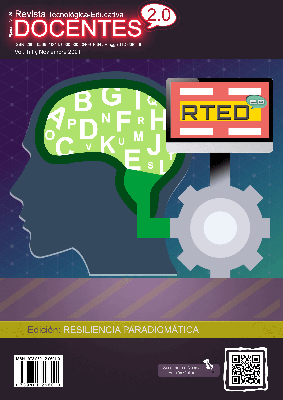The Curriculum in Practice and its Relationship with Learning and Knowledge Technologies
 DOI:
https://doi.org/10.37843/rted.v1i1.261
DOI:
https://doi.org/10.37843/rted.v1i1.261
Main Article Content
Abstract
New cognitive ecologies mark today's society. In this sense, it is essential to lay the foundations to analyze and understand the profession of teaching within the framework of these new spaces. The present study aimed to analyze a practical case on the pedagogical use of technologies at the Higher level. The qualitative method was used for the analysis of the different data collected. From the case study, multiple sources of information were accessed, allowing the results to be corroborated, granting more excellent reliability to the findings. The results showed a series of possibilities and weaknesses when implementing the technologies; they showed different readings and interpretations by the teachers when addressing the curricular documents. Finally, the students felt more involved by working autonomously at their own pace of learning, moving towards a change in the cultural paradigm. The study allowed to deduce the reconstruction of conceptions from the teacher-directed towards a comprehensive approach to learning. Different ways of reading curricular materials evidenced multiple interpretations based on professional biographies, performance contexts, and social circumstances. On the other hand, it will be essential to tend towards a flexible curriculum, organizing teaching from diversity, with conservative approaches to different learning rates.
Downloads
Metrics
Article Details

This work is licensed under a Creative Commons Attribution-NonCommercial-NoDerivatives 4.0 International License.
Those authors who have publications in our journal accept the following terms:
- When a work is accepted for publication, the author retains rights of reproduction, distribution of his/her article for exploitation in all countries of the world in the format provided by our magazine and any other magnetic medium, optical, and digital.
- Authors will retain their copyright and guarantee the journal the right first to publish their work, which will be simultaneously subject to the Creative Commons Acknowledgment License (Attribution-NonCommercial-NoDerivatives 4.0 International (CC BY-NC-ND 4.0)). That allows third parties to copy and redistribute the material in any medium or format, under the following conditions: Acknowledgment - You must properly acknowledge authorship, provide a link to the license, and indicate if any changes have been made. You may do so in any reasonable way, but not in a way that suggests you have the licensor's endorsement or receive it for your use. NonCommercial - You may not use the material for a commercial purpose. NoDerivatives - If you remix, transform, or build from the material, you cannot broadcast the modified material. There are no additional restrictions - You cannot apply legal terms or technological measures that legally restrict you from doing what the license allows.
- Authors may adopt other non-exclusive license agreements to distribute the published version of the work (e.g., deposit it in an institutional archive or publish it in a monographic volume) provided that the initial publication in this journal is indicated.
- Authors are allowed and recommended to disseminate their work through the Internet (e.g., in institutional telematic archives, repositories, libraries, or their website), producing exciting exchanges and increasing the published work's citations.
- Request of withdrawal an article has to be done in writing by the author to the Editor, becoming effective after a written response from the Editor. For this purpose, the author or authors will send correspondence via e-mail: [email protected].
- The author will not receive financial compensation for the publication of his work.
- All Docentes 2.0 Journal publications are under the Open Journal System (OJS) platform at: https://ojs.docentes20.com/.
References
Anijovich, R. (2015). El valor formativo de la retroalimentación. https://www.youtube. com/watch?v=ShlEPX6_NUM.
Barron, B. (2006). Interest and self-sustained learning as catalysts of development: A learning ecology perspective. Human development, (4) 193-224. Coaten, N. (2003). Blended e-learning. Educaweb.
Coll, C. (1985). Acción, interacción y construcción del conocimiento en situaciones educativas. Anuario de Psicología, nº 3.
Marchesi, A. (2009). Metas educativas 2021. Los desafíos de las TIC para el cambio educativo. Santillana
Mujica-Sequera, R. (2020). E-Learning como estrategia pedagógica en la educación superior. Revista Tecnológica-Educativa Docentes 2.0, 9(1), 37-41. https://doi.org/10.37843/rted.v9i1.103 DOI: https://doi.org/10.37843/rted.v9i1.103
Muñoz, M., Fragueiro, M. S., & Ayuso, M. J. (2016). La importancia de las redes sociales en el ámbito educativo. Escuela abierta, 16, 91-104. http://www.ceuandalucia.es/escuelaabierta/pdf/articulos_ea16_pdf/redes%2091-104.pdf
Prensky, M. (2010) Nativos e inmigrantes digitales. SEK 2.0 Editorial. www.marcprensky.com/
Popp, W. (1976). Kommunikative Didaktik. Weinheim.
Rockwell, E. (1986a). Cómo observar la reproducción. Revista Colombiana de Educación, 17, 109-125. DOI: https://doi.org/10.17227/01203916.5141
Fernández, A. (1992). Roles y funciones en el desarrollo organizacional. Congreso interuniversitario de Organización Escolar. Sevilla
Rodríguez-García, A. M. & Martínez, N. (2018). La competencia digital en la base de Scopus: un estudio de metaanálisis. REXE-Revista de Estudios y Experiencias en Educación, 2(2), 15-24. http://www.rexe.cl/ojournal/index.php/rexe/article/view/544/437 DOI: https://doi.org/10.21703/rexe.Especial3_201815241
Sánchez-Camacho, J.M. (2019). Estrategias didácticas con el uso de las TIC para el desarrollo de habilidades motoras básicas de los estudiantes de la Institución Educativa Casilda Zafra de Santa Rosa de Viterbo. Tesis de postgrado. Universidad Santo Tomas. Tunja.
Ross, P. & Tronson, D. (2005). Providing quality feedback – Where to from here? UniServe Science Blended Learning Symposium Proceedings. https://bit.ly/2sC5INn
Valenzuela, R. (2013). Las redes sociales y su aplicación en la educación. Revista digital universitaria, 14(4). http://www.revista.unam.mx/vol.14/num4/art36/index.html






